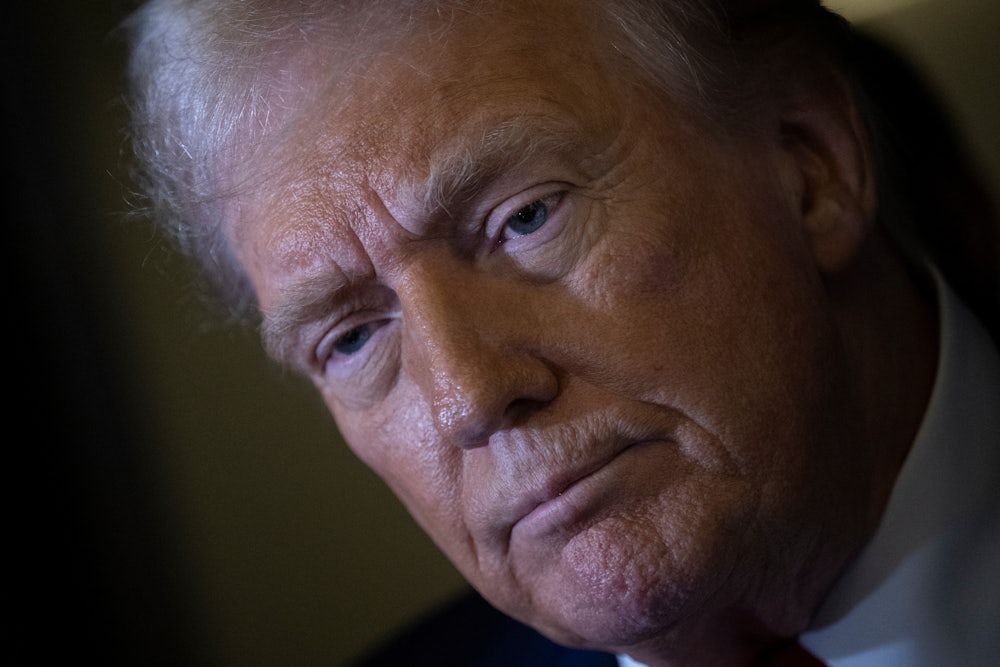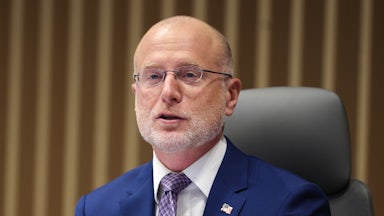If JD Vance were capable of shame, he’d be embarrassed by what just happened. After the news broke that President Trump’s administration admitted to deporting a Maryland man in “error,” Vance lashed out at podcaster Jon Favreau, who had asked him to comment on what had transpired.
“My comment is that according to the court document you apparently didn’t read he was a convicted MS-13 gang member with no legal right to be here,” Vance sneered, in a reference to the deported man, Kilmar Abrego Garcia, a Salvadoran who was removed to El Salvador along with dozens of others.
Except Abrego Garcia did have the legal right to be here, and he is not a “convicted MS-13 gang member.” As explained below, the government accused him of being in MS-13, but that charge was ultimately not settled as a criminal matter, and an immigration judge subsequently granted him protected legal status, as he’d face harm if returned home. He was here lawfully.
Let us gently suggest that these facts don’t matter to Vance in the least. This is not meant glibly: For Vance, that is the case as a matter of principle. He is nakedly asserting the power to decree Abrego Garcia a criminal subject to expulsion, even if—or especially if—the facts show the contrary. The administration is doing this on many fronts, from this case to the efforts to remove foreign students to the deportations of Venezuelans to a Salvadoran prison.
The Abrego Garcia matter illustrates the point. As The Atlantic’s Nick Miroff details, Abrego Garcia is the husband of a U.S. citizen and has a U.S. citizen child with autism, according to his lawyer. He was detained by ICE in 2019 in Maryland, where he lived, and at the time, an associate claimed he was in MS-13, but the police didn’t believe it and didn’t identify him that way, Miroff reports.
The government sought to deport Abrego Garcia at the time, but he fought it, denying the gang association. The accusation was rendered moot when an immigration judge granted him “withholding of removal” status based on violence he’d face if returned to El Salvador.
But in March, Abrego Garcia was detained again by ICE agents who claimed his status had changed, Miroff reports. He was removed to the same Salvadoran prison for terrorists where dozens of Venezuelans have now been imprisoned, all deported pursuant to the 1798 Alien Enemies Act, even though we are not at war with or under invasion by a hostile foreign power.
Importantly, the government now admits that Abrego Garcia did have protected status here. But the administration argues that there is nothing it can do to compel his return, that he shouldn’t be returned, and that the court lacks jurisdiction to order it in any case—because he’s no longer in the United States.
It’s a circular argument: The Trump administration removed him in “error,” but precisely because he was removed, U.S. courts no longer have jurisdiction to ensure him due process, so … let him rot in the Salvadoran prison. Even though an immigration judge had ordered the government not to remove him.
“If nobody can do anything to bring him back once he’s been deported, then the order preventing his deportation in the first place is meaningless,” Simon Sandoval-Moshenberg, the lawyer for Abrego Garcia, told me. He added that this in effect would render judicial decisions moot, meaning the government can deport people on flimsy-to-nonexistent legal grounds, and “no court can reverse it. That’s their argument.”
To which Vance would surely reply: Yeah, and?
It’s important to grasp what Vance means when he says Abrego Garcia “had no legal right” to be here. During the campaign Vance simply declared that those supposed pet-eating Haitians in Ohio were here illegally, even though they enjoyed another form of protected legal status for people facing horrors in home countries.
What Vance meant is that this protected status for Haitians was itself illegitimate because he said so, and therefore it didn’t count. That’s what he means in Abrego Garcia’s case too: He “had no legal right” to be here because Trump and Vance have decreed it so.
It’s true that Trump, in office, has now used executive authority to cancel various forms of protected status. That might be legal, but it’s different from declaring as fact that this status simply doesn’t count, as Vance did in 2024 with Haitians, and as he’s now doing with Abrego Garcia.
The new twist to this ruse is that the administration is now declaring the power to remove people outside the law in “error”—without bearing subsequent responsibility to rectify that “error.”
The pattern is clear. The administration has deported Venezuelans to that Salvadoran prison on the grounds that membership in the Tren de Aragua gang makes their migration an act of war by Venezuela. That nonsense aside, the administration’s metrics for designating migrants as gang members are absurdly thin: They’re based in part on whether they have seemingly incriminating tattoos and even on their “street wear.” In at least two examples, migrants have been removed in part due to tattoos like a soccer logo and a crown image.
What if those are “errors” too?
Well, behold how White House press secretary Karoline Leavitt responded to questions about the thinness of those metrics:
"Shame on you" -- Leavitt gets mad at @AndrewFeinberg for asking her about a document indicating that tattoos are all it takes for migrants to get sent to a slave prison in El Salvador pic.twitter.com/bRkfC8uzsy
— Aaron Rupar (@atrupar) March 31, 2025
Leavitt’s response is to simply continue declaring those deported by these standards to be gang members, regardless of the details. Even deportations in “error” are inherently correct.
Meanwhile, the administration has been targeting foreign students by invoking a statute that authorizes the secretary of state to decree that their presence adversely impacts U.S. foreign policy, meriting their removal. Yet in numerous cases, the government has provided little to no evidence showing how they’ve been designated such a threat.
What if these were done in “error” too? In these instances, courts have stopped the deportations in time. But what if they hadn’t? By the administration’s own arguments, it wouldn’t matter: There’d be no obligation to rectify the “errors.”
It should go without saying that even if we ultimately learn terrible things about all these defendants, they are still entitled to due process. That’s how due process works: It’s afforded to everyone regardless of their eventual guilt or innocence. Indeed, this is precisely how we can be confident in the final decision that they are guilty or innocent under our laws.
That core ideal is exactly what the administration rejects. But what’s the limit on that rejection, exactly? Sandoval-Moshenberg points out that if the government can remove people in “error” without recourse, then that logic could “apply with equal force to U.S. citizens.”
“There’s no limiting principle to that lawlessness,” Sandoval-Moshenberg says, adding that it represents “the ultimate supremacy of power over law. We’re asking the court to reaffirm the supremacy of law over power.”
Sandoval-Moshenberg tells me that on Friday, he’ll ask a judge to order the U.S. government—which claims it cannot compel Abrego Garcia’s return—to merely request that El Salvador return him. This calls the government’s bluff: If his removal was in “error,” doesn’t the administration want to fix it?
We’ll see. For the time being, these “errors,” as you might have gathered by now, appear to be fully part of the design.










